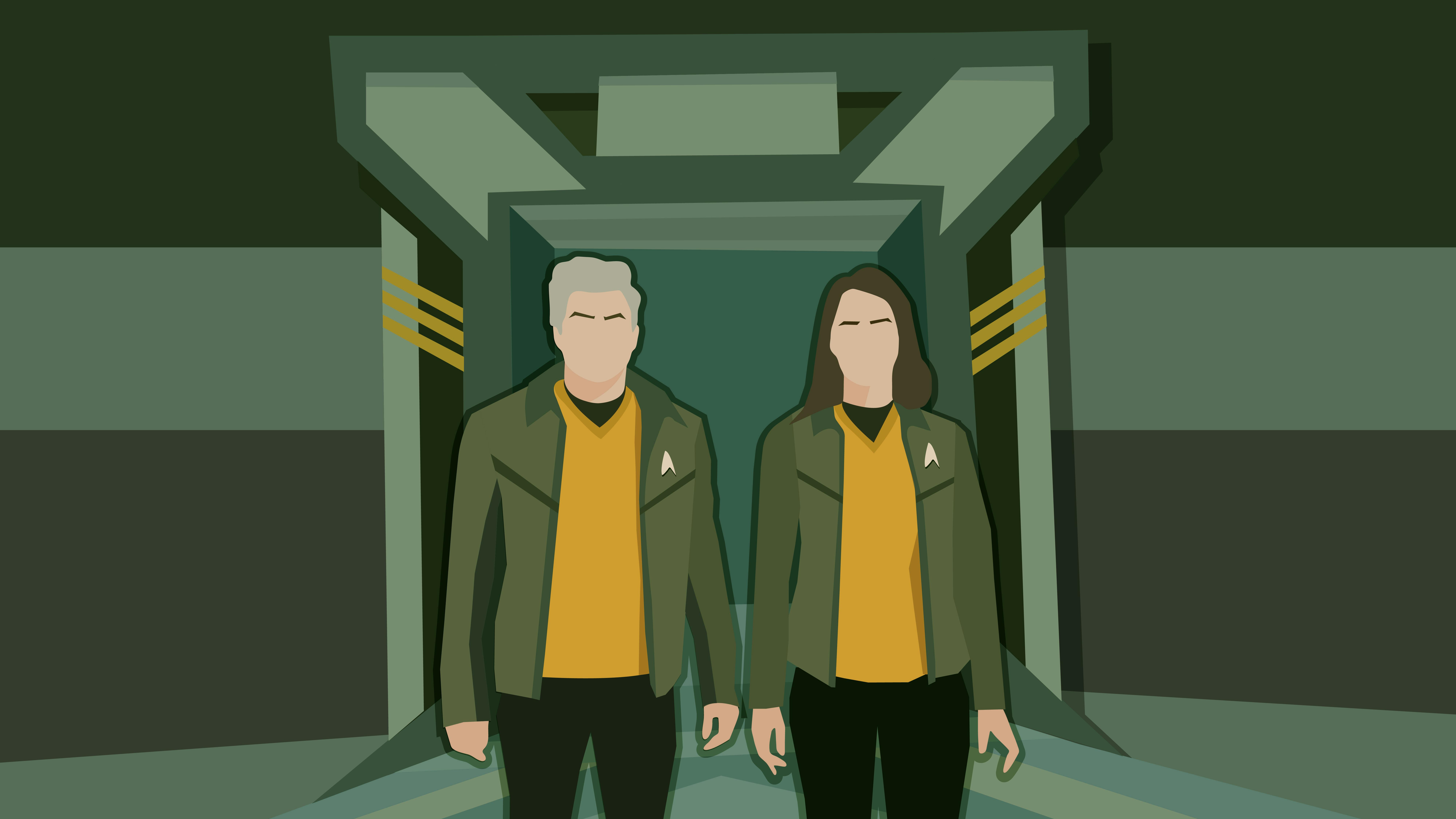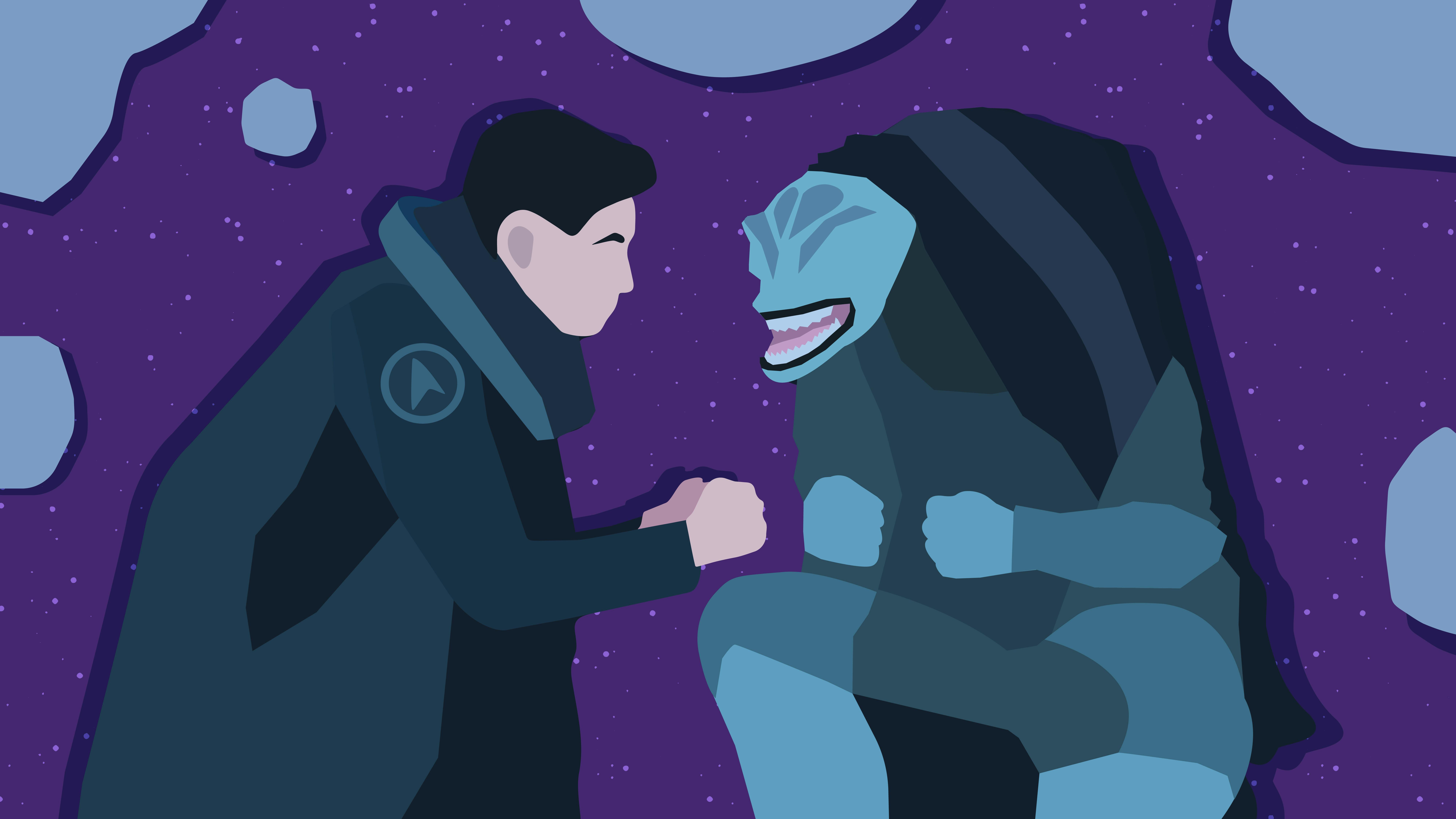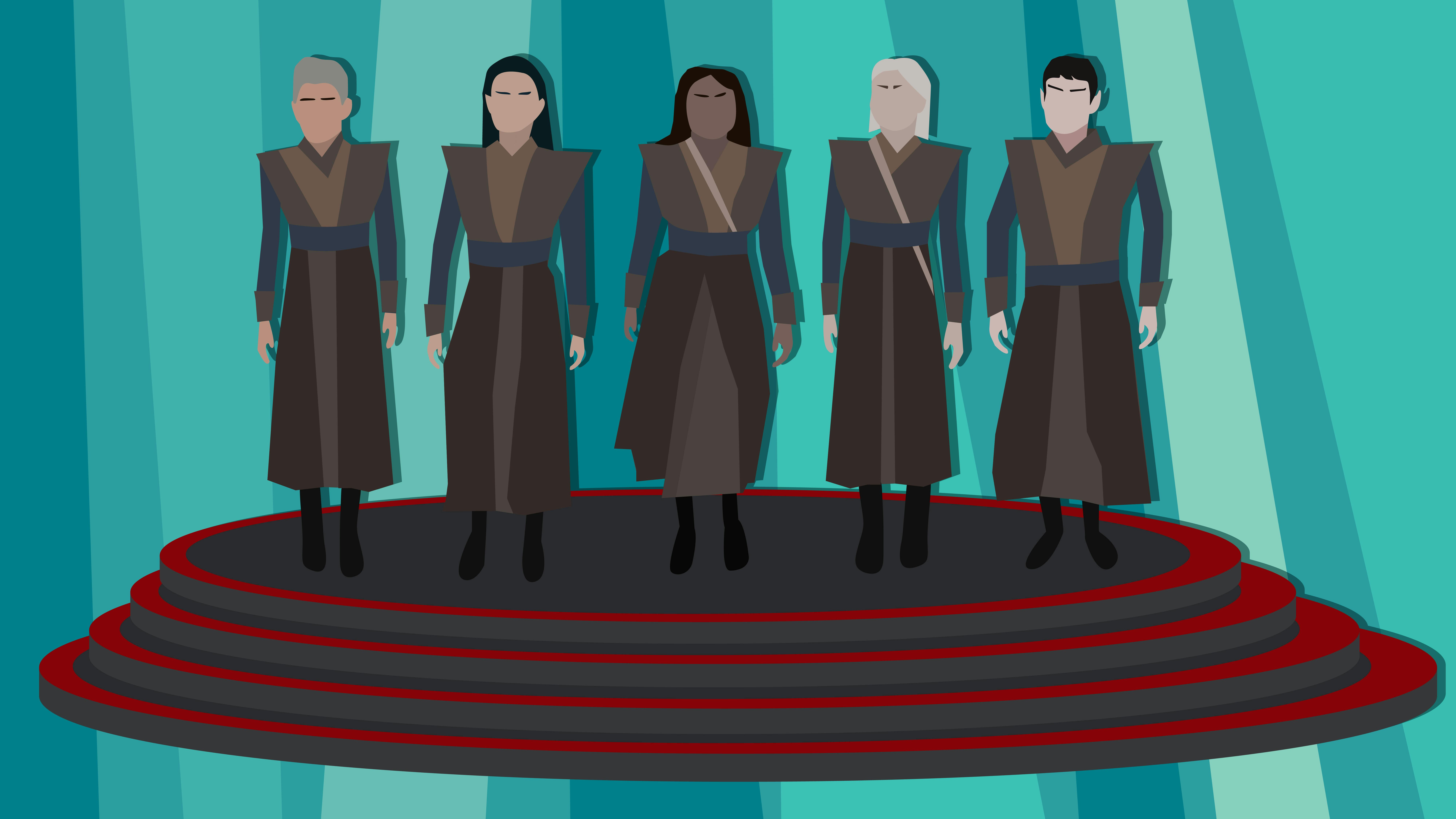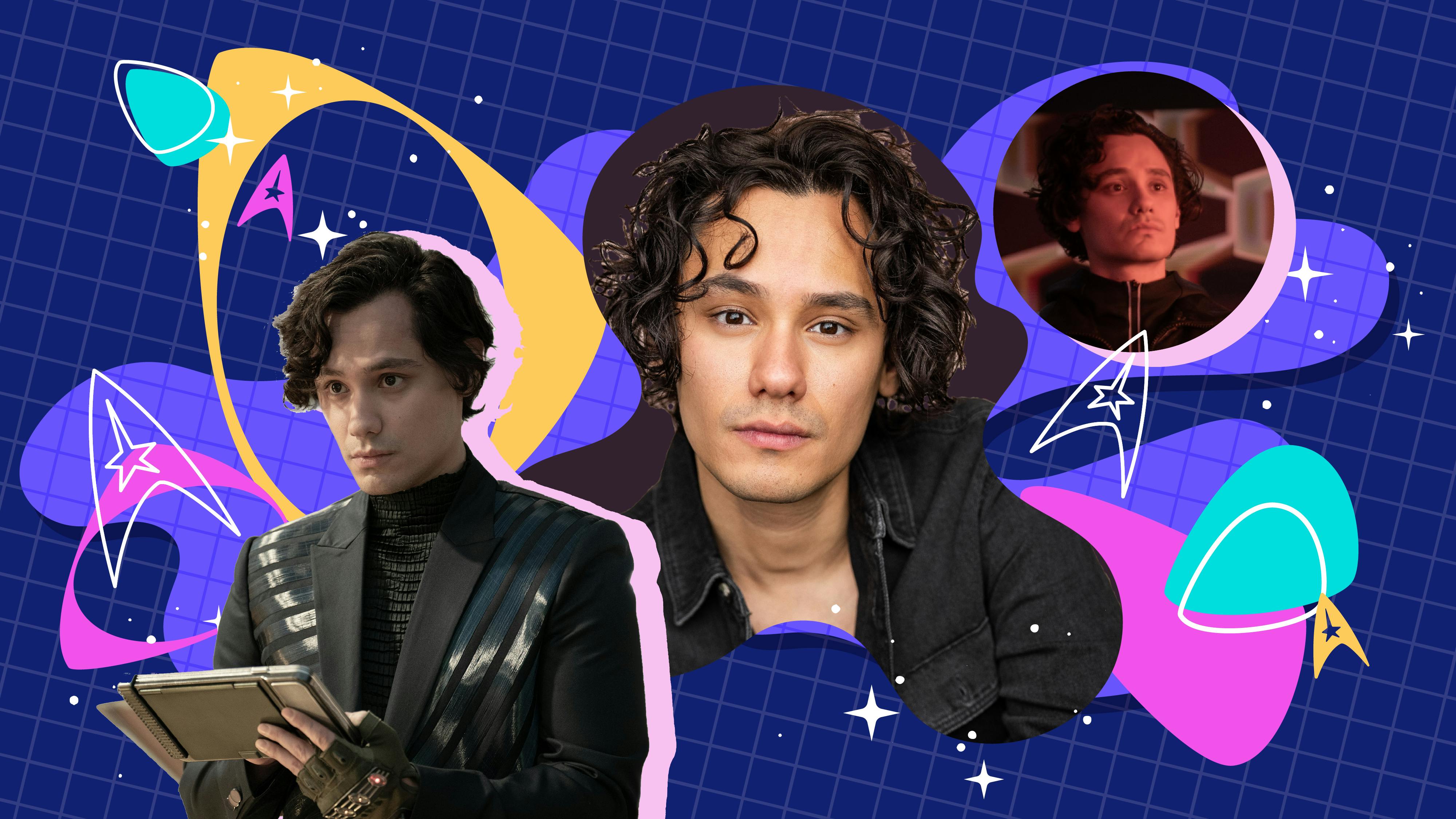Published Jun 23, 2023
RECAP | Star Trek: Strange New Worlds 202 - 'Ad Astra per Aspera'
There's nothing wrong with you; no hidden monster inside.
SPOILER WARNING: This article contains story details and plot points for Star Trek: Strange New Worlds.
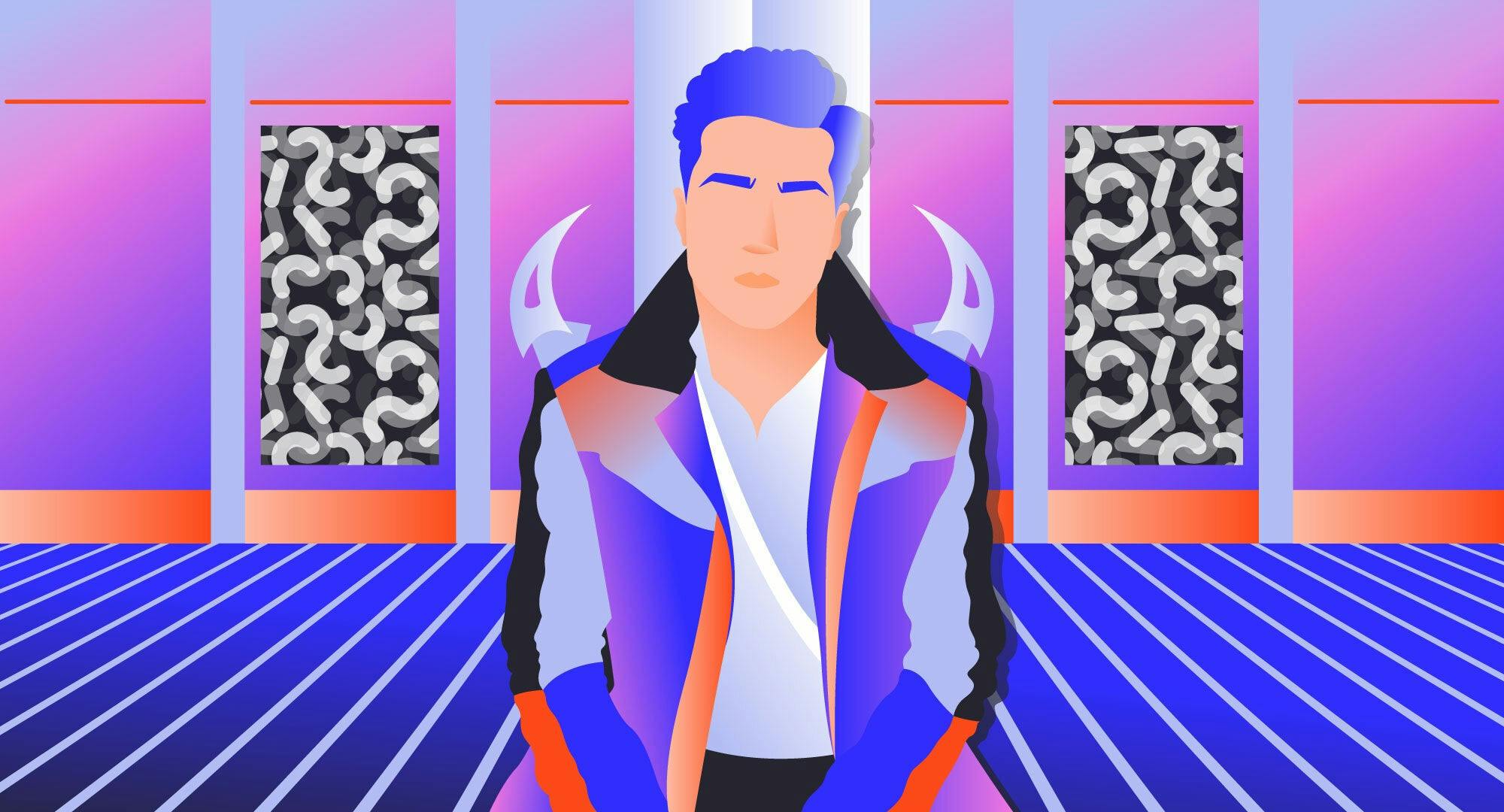
StarTrek.com / Rob DeHart
SPOILER WARNING: This article contains story details and plot points for Star Trek: Strange New Worlds.
In the , Captain Pike is preoccupied with his Number One's upcoming trial, with both frustrated they've been unable to reach Una's defense lawyer of choice. Unwilling to lose his first officer, Pike assures her he will seek out the defense lawyer in person.
In Episode 2 of , "Ad Astra per Aspera," Commander Una faces court-martial along with possible imprisonment and dishonorable dismissal from Starfleet, and her defense is in the hands of a lawyer who’s also a childhood friend with whom she had a terrible falling out.

StarTrek.com
- Una Chin-Riley (Number One)
- Batel
- Christopher Pike
- Neera Ketoul
- Javas
- Pasalk
- La’An Noonien-Singh
- Erica Ortegas
- Dr. Joseph M'Benga
- Spock
- Nyota Uhura
- Zus Tlaggul
- Chiv
- Robert April
- Christine Chapel

StarTrek.com
- Vaultera Nebula Colony
- Starfleet Headquarters, San Francisco, Earth
- U.S.S. Enterprise

StarTrek.com
Gazing at a city’s sparkling lights, a young girl with a severe leg wound overhears her parents debate sending her to a hospital. Her mother assures her, all will be okay, as the girl’s injury gives off an orange glow. Afraid that a doctor’s visit will expose their family and ruin their lives, the girl’s father says her name — Una.
Commander Una Chin-Riley reflects on the memory as she stares at San Francisco’s Golden Gate Bridge from her cell. Una meets with the prosecutor, Captain Batel, who offers the first officer a deal — plead guilty and Starfleet will accept her dishonorable dismissal without prison time or exile. Una balks, viewing this as Starfleet trying to cover its mistake. Una’s counsel advises her to accept, though she doesn’t have faith in him counseling her, as he works for the prosecution.
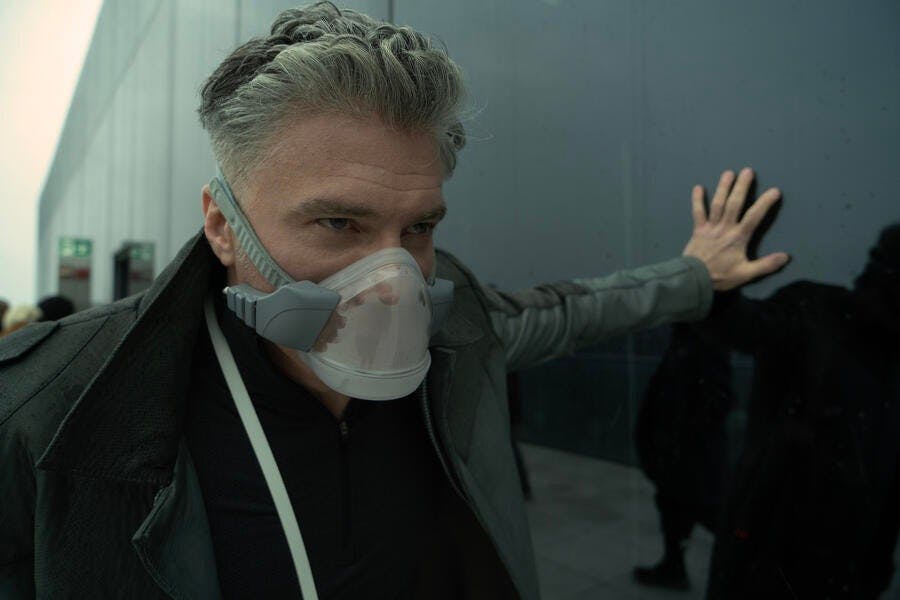
"Ad Astra per Aspera"
StarTrek.com
Captain Christopher Pike endures a chilly day on a planet in the Vaultera Nebula. The atmosphere is not suitable for humans, requiring Pike to don a respirator. Inside Counsellor Neera Ketoul's building, Pike calls her assistant’s bluff and lets his oxygen run out. Pike bursts into the lawyer’s office, gasping for air as she adjusts the environmental controls to suit human biology. Ketoul is Illyrian — genetically modified to survive here. She refuses to see how Starfleet’s unwillingness to let Una — another Illyrian — serve openly is her problem and denies having a friendship with her. Pike credits a recent mission with illustrating what happens to Illyrians who reverse their modifications to be accepted. Unimpressed, Neera voices dissatisfaction with Starfleet’s draconian race laws, confessing she has kept up with Una’s case. Before leaving, the captain mentions the counselor’s 10 cases against the Federation, which were thrown out due to insufficient evidence. Winning this trial could bring attention to Ketoul's other Illyrian clients. The lawyer remains steadfast, but does not say “no.”
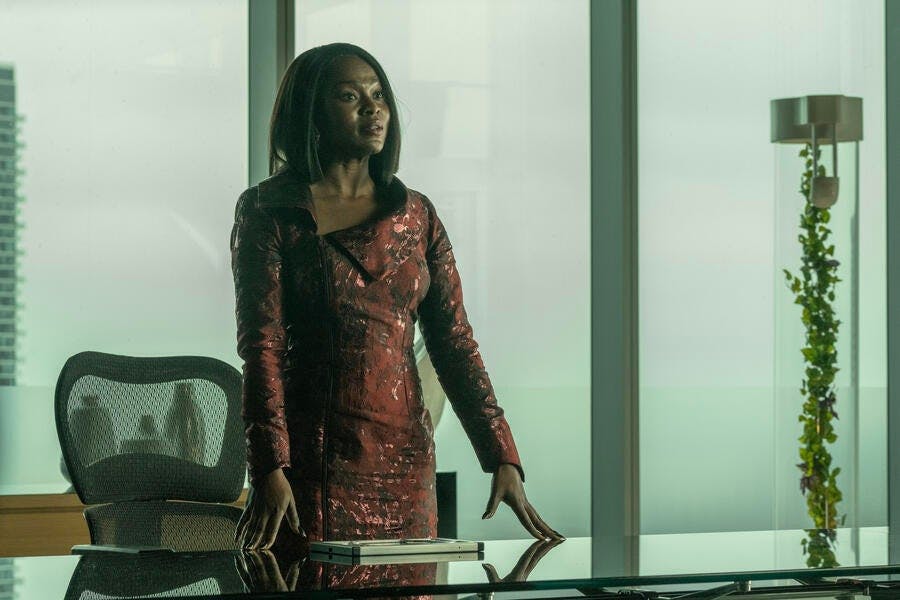
"Ad Astra per Aspera"
StarTrek.com
Neera meets Una in her cell, breaking their 25-year hiatus from speaking with an “I told you so”-type quip. Uninterested in reuniting, the counselor has Una recap her story. Until two months ago, the officer’s record was spotless. The change? Someone reported her heritage to Starfleet. Una emphasizes she shouldn’t have to hide anymore — no Illyrian should. Neera relents and accepts the assignment, stating she is doing it for herself and all the Illyrians who can’t — or won’t — pretend to be someone they are not.
Captain Batel stands at the door to Pike’s quarters aboard the U.S.S. Enterprise, irritated by Una’s rejected plea deal. Pleased at the news, Pike feels betrayed by Batel’s role in his first officer’s arrest, despite assurances she sought to help Number One. The argument escalates, and Pike inquires, “What if the law is wrong?” Batel states the Judge Advocate General is looking into the case.
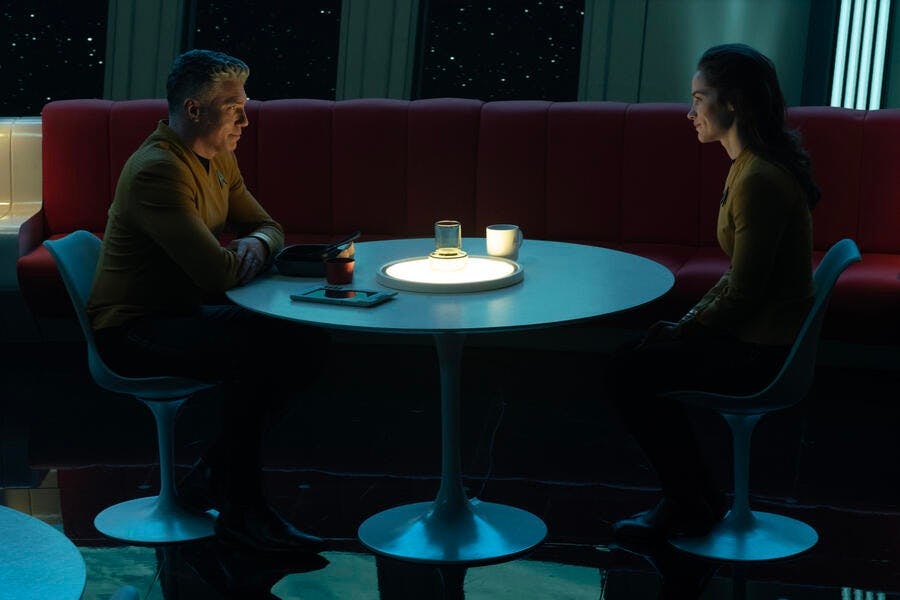
"Ad Astra per Aspera"
StarTrek.com
Ketoul and Chin-Riley, as well as Batel and her superior, Vice Admiral Pasalk, confer with Admiral Javas at Starfleet Headquarters. Additional charges, including sedition, are being filed, and the prosecution seeks a dishonorable discharge and 20-year prison sentence. The defense retreats to Una’s cell, where Neera declines Una’s desire to take the stand; the prosecution will seize the opportunity to implicate her friends.
Lieutenant La’An Noonien-Singh escorts Ketoul to Una’s quarters on the Enterprise, where the lawyer will live during the trial. Neera listens as the security officer brings up Starfleet v. Wyck, a case used as an example of “fruit of the poisonous tree.” Evidence procured through illegal means is inadmissible in court. A determined La’An perceives this applies to Una’s situation and promises to investigate.
Captain Pike reads in the Enterprise’s mess hall, pausing when Batel takes a seat. Batel intuits Pike’s disappointment over not being part of the defense’s witness list and asks how he met Una. The future first officer approached Pike after he gave a speech to her Starfleet Academy class to highlight an error. Batel interrupts Pike’s fond remembrance with a question, adopting a rigid prosecutorial tone and questioning when he learned Una was Illyrian. Pike concedes Batel’s point — taking the stand would center the case on the captain’s failure to report Una’s ancestry.
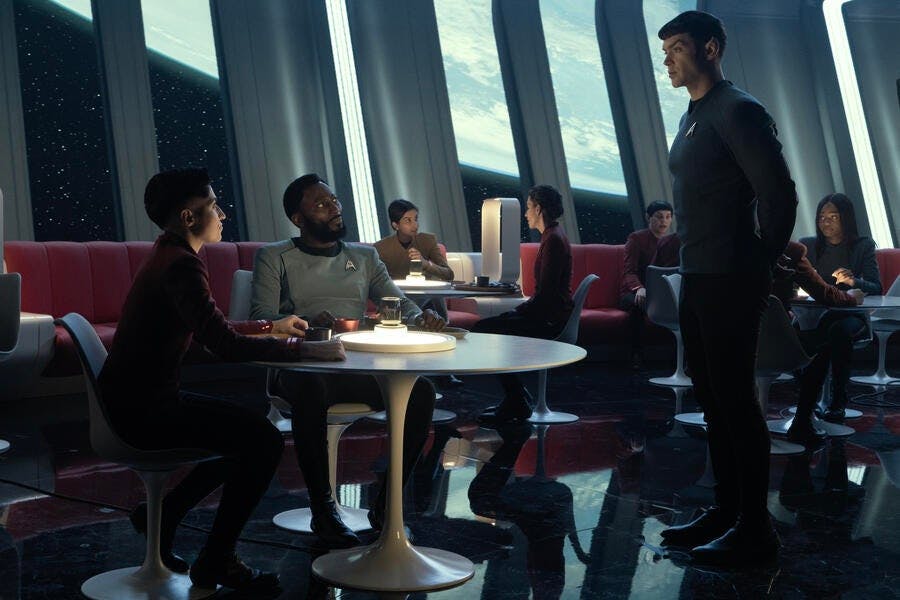
"Ad Astra per Aspera"
StarTrek.com
Across the mess hall, Lieutenant Erica Ortegas and Dr. Joseph M’Benga watch Admiral Pasalk and Spock chat. The two Vulcans display no emotion, leading Ortegas to guess they are engaged in a dull conversation about kal-toh. M’Benga disagrees, noticing subtle tension in their body language. Spock finishes with Pasalk and approaches them, apologizing that they witnessed his “outburst.” A former colleague of Sarek, Pasalk brings out the worst in Spock, at least so he believes. Flabbergasted, Ortegas and M’Benga share a quiet laugh once Spock departs.
Up on the Bridge, La’An petitions Ensign Nyota Uhura for communications — including personal logs — referencing Una from the last six months. Uhura hesitates, citing the regulation that only Starfleet Command can unseal private files. Aware La’An wishes to break rules to aid her mentor, Uhura denies the request to protect La’An. The ensign urges La’An to find another way to discover who turned Una in.
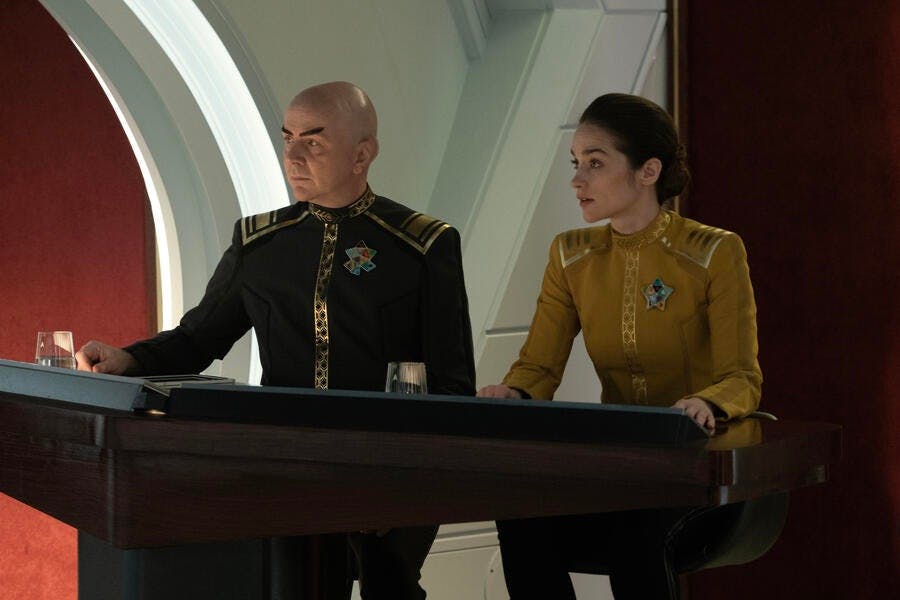
"Ad Astra per Aspera"
StarTrek.com
The trial commences on Earth, with Admiral Javas presiding alongside Space Command Representative Zus Tlaggul and Starfleet Commander Chiv. Pike and his senior officers follow along via the Ready Room’s viewscreen. Una pleads not guilty. Batel outlines the illegality of genetic engineering, recalling the tens of millions who died during the Eugenics Wars* to prove the folly of “playing God.” Ketoul remarks that slavery, apartheid, and discrimination against people for how they worshiped, who they loved, their gender, and their skin color were once legal. She asserts “a law does not make something just.” To Neera, the Federation became blinded by a centuries' old fear.
Admiral April testifies that he would not have sponsored Commander Chin-Riley's Starfleet application had he known about her modifications. The admiral claims this is based on the law, but Ketoul recites his willingness to violate General Order 1 — now known as ** — to help pre-warp societies avoid extinction in 2246 and 2248. Apparently, Starfleet's rules only apply when a captain deems they do. The defense pushes too far, accusing April of basing his opinion on racial prejudice. The three judges — human, Tellarite, and Vulcan — cease the proceedings and strike April's answers from the record.
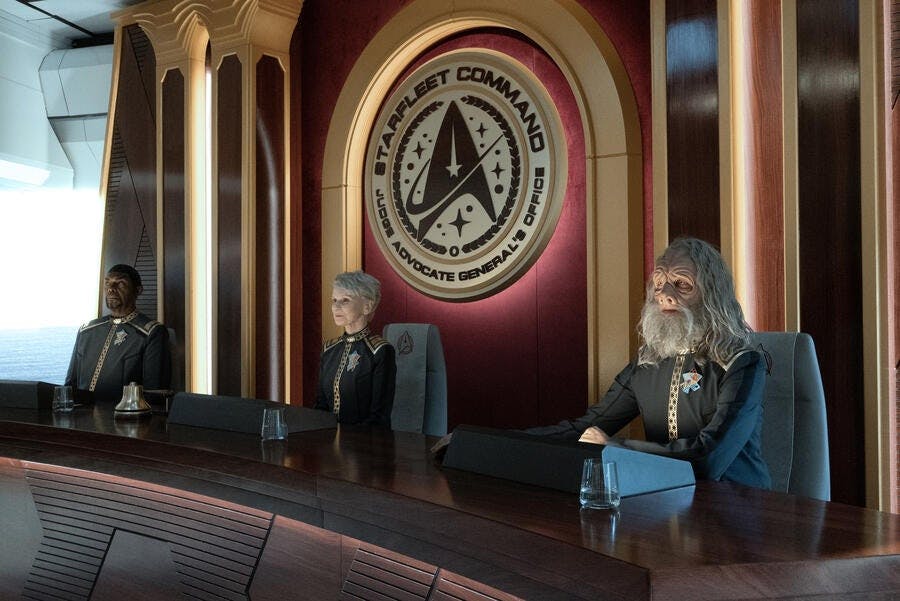
"Ad Astra per Aspera"
StarTrek.com
April heads to Pike's quarters, reminding the captain that he recommended Una for the Medal of Gallantry and regretting that the court did not get to hear that side of his story. Back in her cell, Number One is equally upset with her counselor, accusing Ketoul of seeking a "soapbox" to preach about the Federation’s views on Illyrians.
Returning to the courtroom, the defense calls expert character witnesses — La'An, Spock, and M'Benga. Outfitted in a dress uniform, Spock raises an eyebrow as he reveals the one thing he sensed Chin-Riley concealed — an affinity for Gilbert and Sullivan musicals. The trio describe her as a mentor, friend, and family member whose accolades include rescuing La’An from the Gorn.
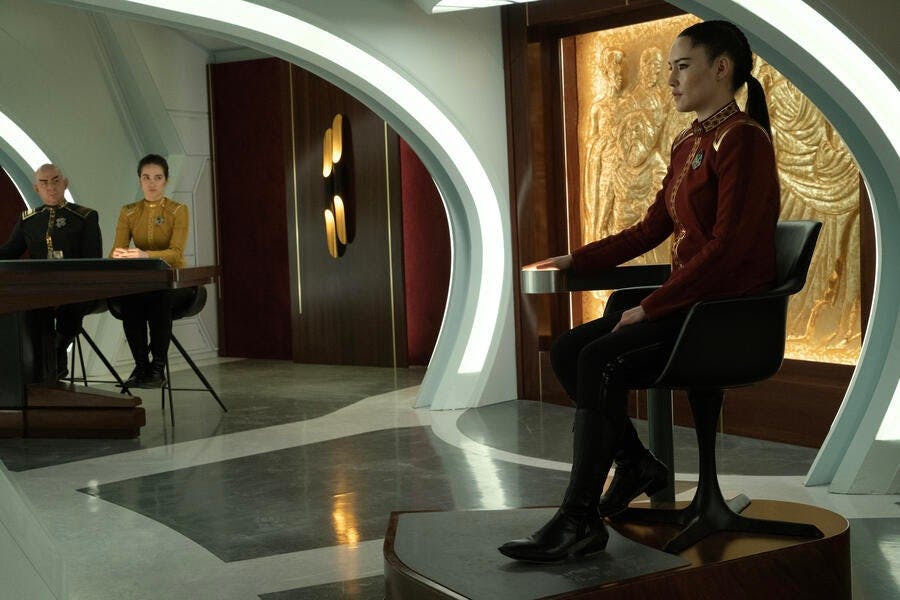
"Ad Astra per Aspera"
StarTrek.com
La'An joins Neera in Una's quarters. Guilt-stricken, she thinks the angry personal log she recorded after learning Number One lied about being Illyrian was responsible for Una's arrest. La'An confesses her worries about her shared bloodline with Khan Noonien Singh, but the attorney assures her there is no hidden monster inside of her.*** Ketoul argues that “genetics is not destiny” and alleviates La'An's concerns — it takes 6 months to subpoena a personal log, so her entry was not to blame. It must have been someone who would gain from leaking Una’s identity.
The trial resumes, and Ketoul shocks the room by calling Chin-Riley to the stand. Number One cites Starfleet's pre-Federation motto, ad astra per aspera — "to the stars through hardship," as a reason she joined up. Una reminisces on her childhood at a colony, which agreed to the Federation’s condition that all genetic modification cease. Some families complied, but Una's practiced these customs as cultural traditions. Rituals were performed in secret. Others — such as Ivan Ketoul, her best friend's 10-year old cousin — were outed, ostracized, and arrested. The persecution of Illyrians encompassed everything from being called “Augments” and “Moddies” to fearing for their lives.
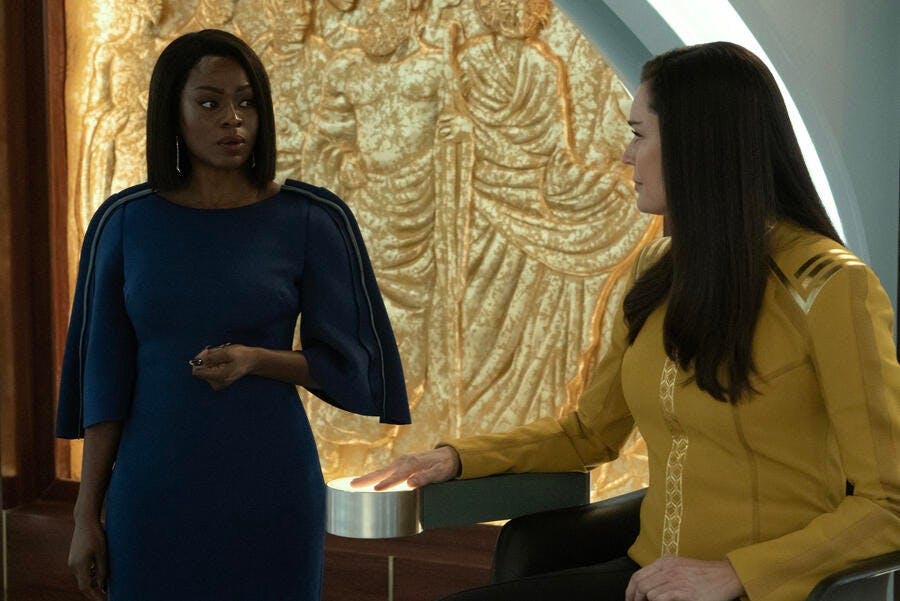
"Ad Astra per Aspera"
StarTrek.com
As a child, Una broke her leg while stopping a fight. It became infected, and the girl would have died had they not found an Illyrian doctor who valued discretion. The government divided the colony into two cities — Illyrian and non-Illyrian. Chin-Riley's family left those they knew behind and hid in the non-Illyrian settlement. Neera concludes by pressing Una about how someone so adept at disguising her nature was discovered by Starfleet. Una ultimately relents — she turned herself in.
Perplexed glances infiltrate the audience. A defiant Number One explains she wanted her crew to know her truth and Starfleet to better understand Illyrians. A Federation starship visited Una's colony when she was five or six, and the crew's diversity inspired her love for Starfleet. Her counsel rests, but Admiral Pasalk pushes Una to tell him when Captain Pike became aware of her status as an Illyrian. Chin-Riley reluctantly admits Pike knew for four months, well before her arrest. Pasalk declares it a conspiracy. The Vice Admiral delivers a harsh closing, but Ketoul has Batel read Starfleet Code 8514 aloud:
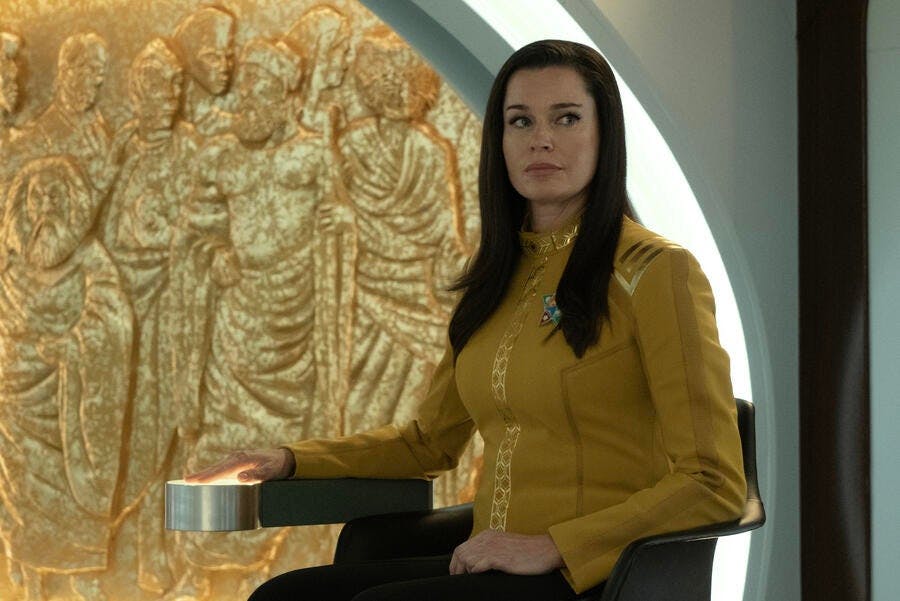
"Ad Astra per Aspera"
StarTrek.com
In extraordinary and extreme circumstances, if the following conditions are met —
- any person fleeing persecution or fearing for their life due to political or religious beliefs, cultural engagements, or biological truths may...
- seek safety within Starfleet and...
- upon revealing themselves to authorities and making a request may be granted asylum. Starfleet captains must exercise discretion and judgment when offering asylum.
This mirrors Una's flight from persecution and the asylum given by Captain Pike. If the court confirms it, Una and Pike will be absolved of all violations. The counselor maintains the law reminds us how to be our better selves, something the judges can do by accepting Una's asylum. Delivering the verdict, Admiral Javas agrees the genetic engineering issue is nuanced. Lines must be drawn, but they must also shift when necessary. Javas grants Una asylum and judges her not guilty.

"Ad Astra per Aspera"
StarTrek.com
Commander Chin-Riley returns to duty, beaming up to the Transporter Room and thanking Neera for saving her life. Those present — including Captains Pike and Batel — erupt with applause for the Illyrian lawyer, who sees the verdict and the crew's love for Number One as a good start for Federation-Illyrian relations. Ketoul beams away, and Una orders the senior staff back to their stations. Once the crew departs, Pike demonstrates his relief by embracing Una in a firm-but-friendly hug. The captain then pats his Number One on the arm and expresses appreciation for having her back.

StarTrek.com
* "Borderland" - This Star Trek: Enterprise episode discusses genetic engineering, Augments, and how the Eugenics Wars affected Earth.
** "The Return of the Archons" - The Prime Directive, first referenced in this Original Series episode, is clear — Starfleet is not to interfere with the development of a culture that is living and growing. Violations of the Prime Directive can have serious consequences, despite a crew and/or captain's best intentions.
*** "Space Seed" and Star Trek II: The Wrath of Khan - Both are two crucial entry points to learning more about the genetically-enhanced Khan Noonien Singh. It is his ambition that helped further the Eugenics War. Khan is the reason why Starfleet has banned enhanced individuals.

StarTrek.com
- Written by Dana Horgan
- Directed by Valerie Weiss

